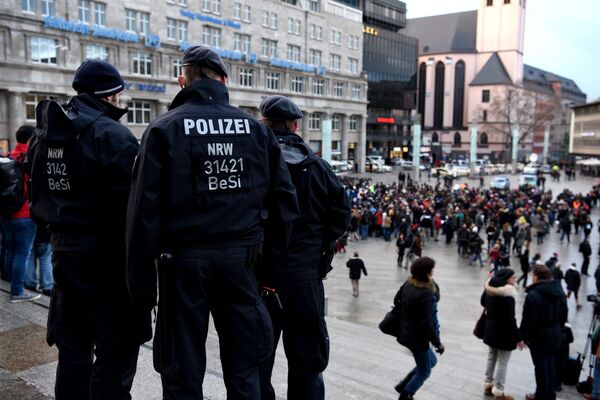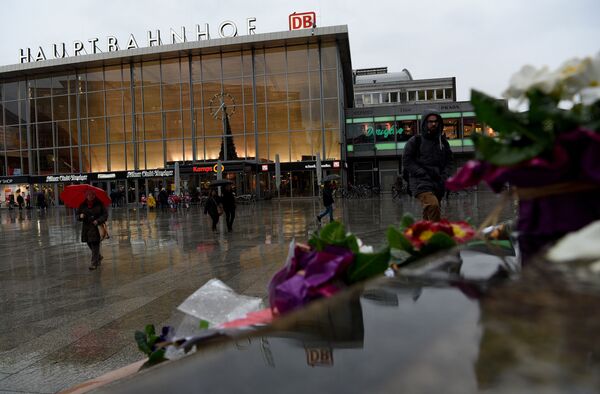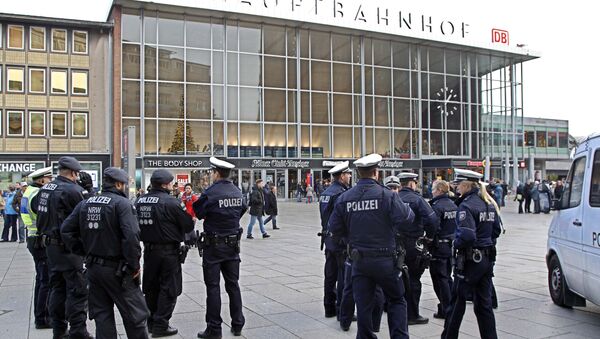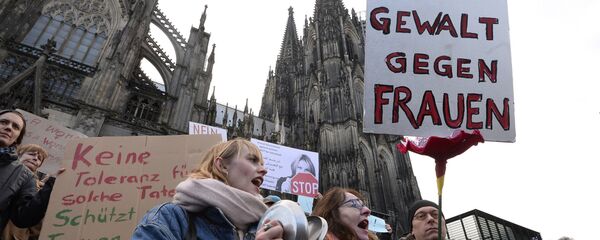It was 23:38 pm on 2015/16 New Year's Eve in Cologne when Lisa S., 17, rang the police.
"We are right now in Cologne's central station and have just walked through the entry hall where there are loud people who, as soon as one walks through them, they grope her all the way under her dress… They get into one and do not let her go.
"Police officers are also standing there, but doing nothing. Nothing at all."
Lisa S. was appalled. Minutes earlier, she and her girlfriends approached a police officer for help. He told them to call the emergency service.
"This is not normal," Lisa said to the person on the other side of the receiver, who quickly agreed:
"No, this is definitely not normal."

Cologne-based German newspaper Sonntag Express published this and other similar recordings on December 11.
Lisa S. would share her memories of that awful night in a TV documentary broadcast by RTL on December 12, titled 'The Night of Powerlessness.'
According to the official version of the events, the police were outnumbered and caught by surprise.
Alice Schwarzer, publisher and editor of Emma, Germany's historical feminist magazine, begged to differ, as early as April, with her book 'Der Schock' — the very first dedicated to the NYE Cologne attacks.
Feminist, Alice Schwarzer, says the sexual attacks in Cologne make it necessary to look closer at Muslim immigration pic.twitter.com/p7oRs1U2FQ
— Mio Ilickovic (@ilickovic1) January 24, 2016
"Now forensic analysis of the 690 complaints for sexual violence confirms my early conclusions: there were not only too few police officers but, worse, those who were there did not take women's complaints seriously," Schwarzer told Sputnik.
"The police officers often simply told women to go home. Or they looked the other way."
Most of the migrants involved in the Cologne rapes weren't from war-torn countries. https://t.co/53yWuZpu77
— Heloise (@HeloisePatrice) October 8, 2016
Another victim, Alina K., 22, made a call to the police at 01:15 am on 01.01.2016.
When you report a complaint to the German police, it will be ranked for priority, from 1 to 4. Alina K. said her clothes had been repeatedly teared down by multiple foreign looking people trying to rape her. She had to fight back their attacks. Her wallet was also stolen.
Police ranked Alina's call priority 1.
Ten minutes later, at 01:26 am, the record show that Alina's call was — until now, unexplainably — downgraded to a mere priority 4. Just "DB, Diebstahl," German for pick-pocketing.
Alina K. also said she heard a police officer tell the women:
"Well, girls, next year think twice before coming to Cologne."

This is, however, not just the story of German police failing victims of mass sex assaults. It is the story of an open door policy towards — mostly illegal — immigrants gone awfully wrong. And still hotly disputed, at home and abroad, with Germany's election looming large in 2017.
"We know in Germany of sexual violence perpetrated by local men," Schwarzer said.
"But the NYE assaults had an unprecedented quality: they were not the violence of individual men against individual women, it was a collective act of 2,000 men against all women.
"It was an attack on women's freedom. It was not about sex. It was about power. This was a terrorist act carried with male hands as weapons. And it was about driving women away from the public space," Schwarzer told Sputnik.
Indeed the recorded calls leave no doubt as to who the attackers were.
Stefanie T., 22, called at 02:21, and spoke of a "chaos with regard to refugees."
"They [are] groping and it's really chaos. We also see no police who can help. We just came down the stairs from the platforms and they groped us between the legs. And now I panic because I don't know how to go back home. There's really just chaos here."
It defies belief that Marco S. 41, head of the police control room that night, later testified to the investigating committee that:
"…as I finished my service at 6:00 am, I knew nothing of the sex attacks."
We learn from the Rhineland police's website that, this year, "circa 1,500 officers will be in service during the New Year's Eve. 300 officers in teams of three, easily recognizable from their fluorescent jackets, will be available to speak to the public near the station, Dom, Rhine banks and parks, and over the Old Town."
Cologne will have 10 (ten) times the amount of police officers working on New Years Eve 2016 because of the rape attacks last year.
— Billstraightener (@Billstraighten) December 15, 2016
As for what Germany should next do, Alice Schwarzer has done the maths for Merkel:
"Firstly, Germany should better protect its borders. One third of the attackers were illegal migrants, the rest were refugees.
"Secondly, we must finally realize that political Islam poured oil into the fire of these men's patriarchal traditions. Prerequisites for every right of hospitality in this country should be the recognition of the rule of law and equal rights among sexes," she added.





